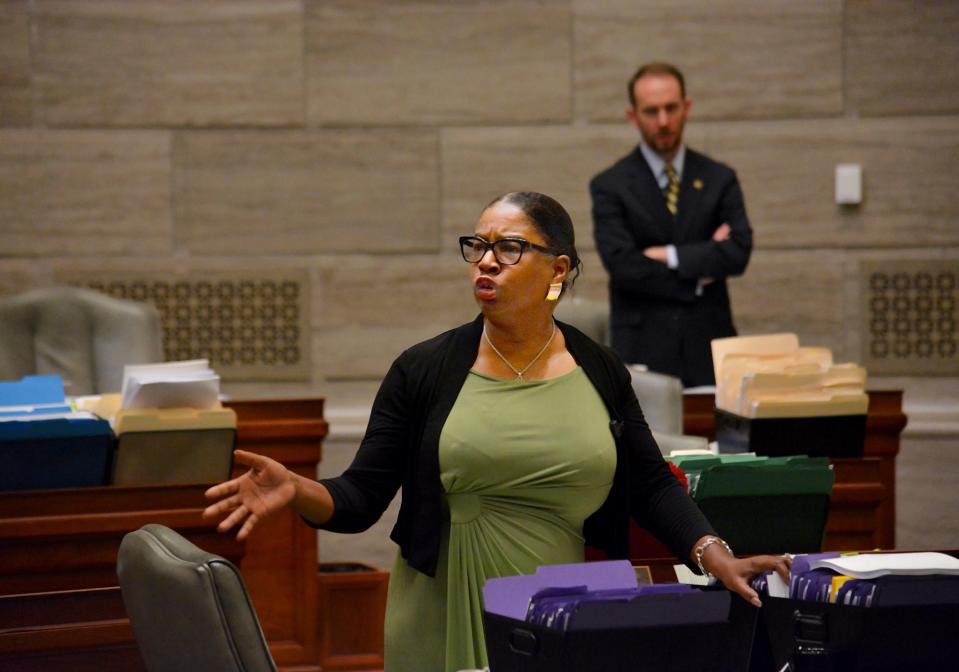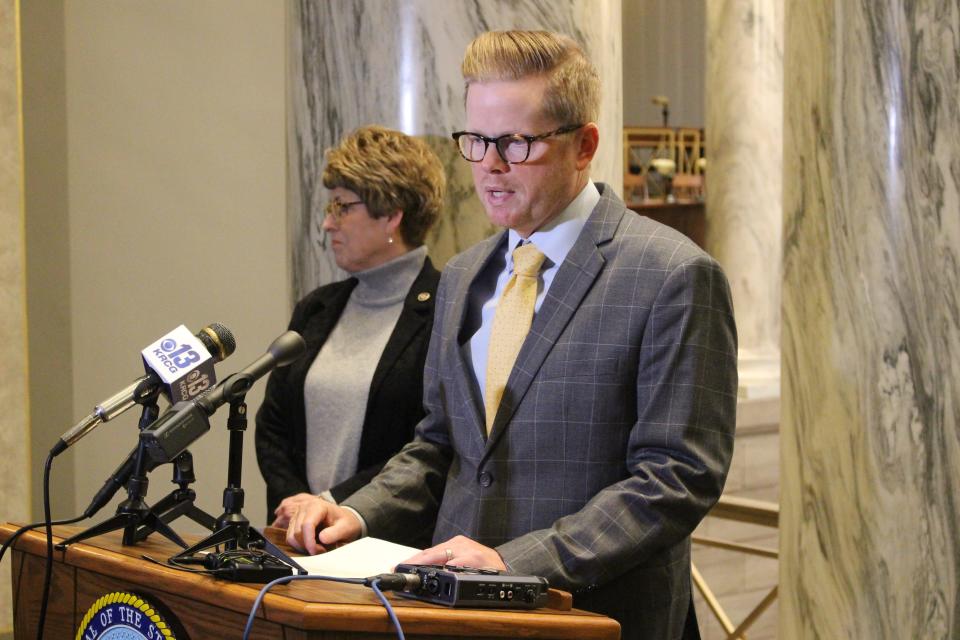A key question in Missouri's state Senate: How should schools talk about race and gender?
- Oops!Something went wrong.Please try again later.
JEFFERSON CITY — In the early weeks of a legislative session where K-12 education quickly emerged as a motivating issue, the Missouri Senate has found itself grappling with a contentious and vital question: How should schools teach and discuss race, gender and the "ugly parts" of U.S. history?
A Republican-led bill that would ban the teaching of "critical race theory" in schools, as well restrict teachers from teaching certain concepts relating to race, resulted in Democrats playing defense for hours on the Senate floor last week. Another GOP bill, which would ban school staff from discussing gender identity or sexual orientation with students, will receive a hearing this week.
The proposed measures have resulted in passionate committee meetings and a tense floor debate as the chamber's minority members decried the bills as attempts to censor difficult conversations about Black and LGBTQ+ history.
"The world is going to teach them," Sen. Karla May, a St. Louis Democrat, said on the floor Wednesday. "They need to learn it so they won't perpetuate it. People innately perpetuate discrimination. ... We need to teach our kids the ugly parts of America."

Her remarks came as the Senate debated Senate Bill 4, a measure sponsored by Republican Sen. Andrew Koenig of St. Louis that would, among other things, ban "critical race theory," which traditionally refers to a graduate-level legal academic framework, but is not defined in the legislation.
K-12 schools in Missouri do not teach "critical race theory" by definition — in a 2021 survey, just one district said that any of its curriculum contained elements of the framework.
But Republican proponents argue that the theory represents a broader culture of "radical" teachings rooted in race and far-left theory, with Koenig saying on the Senate floor that "CRT left the universities long ago and has manifested itself" in schools and other aspects of life. Sen. Ben Brown of Washington said that "what CRT means to one person isn't going to be what another person means."
A third Republican, Sen. Rick Brattin of Harrisonville, compared the theory's tenets of systemic racism and oppression to what was taught to children in Nazi Germany.
"We saw the result of the ultimate hatred of race and in how one was taught to be superior to another," Brattin said.
Their remarks and the contents of the bill drew opposition from Democrats, who took the floor and held it for several hours until the chamber adjourned for the day without a vote. Sen. Doug Beck of St. Louis suggested that the legislature focus on more pressing school-related matters, proposing an amendment to require five-day school weeks as more districts move to four-day weeks. Sens. Barbara Washington of Kansas City and Steve Roberts of St. Louis spoke to each other for nearly an hour, ticking through Missouri's African-American history.
The floor debate took place on the first day of February, which is Black History Month — though members from both sides of the aisle said they did not believe the timing was intentional.
Washington, an attorney, told reporters Thursday she was concerned about the current language of the bill, which she said is written in a way that does not carve out specific exceptions and could be broadly interpreted.
"You can put CRT in there, but that's not what we're attempting to ban," she said. "We are attempting to ban any teaching that is not what that parent wants, taking away the rights of local school districts to teach what is best for their communities."

Republicans weren't able to advance the bill, but Senate President Pro Tem Caleb Rowden of Columbia said leadership intended for it to remain a priority.
"We're back in the back rooms talking about it, trying to find a path forward," Rowden said. "I think probably plan to see that back up in these next couple of weeks would be my guess."
The lead Republican's primary concern as it pertained to the bill, he said, was politically motivated teachers pointing students in a certain direction during sensitive conversations.
"I think the impetus for moving down this road is not to erase history, it's to make sure the kids know and can make decisions based on an accurate view of history, and not want this bias," Rowden said.
More:Plan making it more difficult to approve ballot measures in Missouri passes House
Committee to consider bill banning discussions of gender, sexual orientation
On Tuesday, a Senate committee will consider another bill restricting teachers, students and counselors from talking about gender and sexual orientation in schools.
Ash Grove Republican Sen. Mike Moon's Senate Bill 134 would ban school staffers from discussing "gender identity or sexual orientation with a student" unless they are a licensed mental health provider with permission from the student's parent or legal guardian.
The legislation and similar proposals across other states regarding how gender and sexual orientation can be discussed in schools have been decried by opponents as discriminatory against LGBTQ+ students and potentially harmful.
Galen Bacharier covers Missouri politics & government for the News-Leader. Contact him at gbacharier@news-leader.com or on Twitter @galenbacharier.
This article originally appeared on Springfield News-Leader: Missouri Senate grapples with how schools should discuss race, gender
